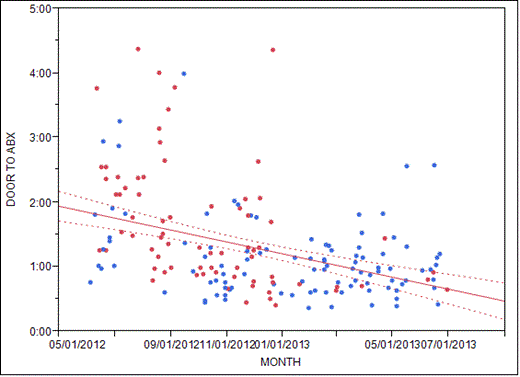Abstract
Fever and sepsis in neutropenic or very immunocompromised patients (VIP) can lead to rapid progression of infection and is an oncologic emergency. Many cancer patients (pts) now receive therapy in the outpt setting, including BMT and hematologic malignancy pts. However, outside of normal clinic hours these pts need to have rapid access to medical attention. Methodist Hospital in San Antonio, Texas provides emergency services to a large number of community oncology practices and to the BMT pts of the Texas Transplant Institute. A task force of nurses, Emergency Department (ED) and BMT physicians, and community hematologist/oncologists was formed to develop a protocol to rapidly assess and treat pts with febrile neutropenia. Pts were provided with a kit, education on fever, and ID card that would identify them as a VIP that they could easily present to the triage nurse in the ED. Pts were enrolled through private physician clinics and the BMT unit. A preprinted protocol was agreed upon by the physicians that ordered the necessary lab and cultures and appropriate broad spectrum antibiotic when pts presented with their VIP card and reported fever. Target time lines were set to accomplish each step of the protocol. Education sessions were provided to the ED nurses on the importance of febrile neutropenia and oncology/BMT physicians attended ED physician staff meetings to stress the importance of implementing the protocol. The VIP protocol was implemented in June 2012 and we retrospectively reviewed the first 12 months of data. Pts with fever and history of cancer or BMT presenting to the ED were reviewed. There were 187 pts meeting this criteria in the 12 month period, 96 pts had the VIP protocol initiated at triage in the ED and 91 pts did not. Reasons for not implementing the VIP protocol in eligible pts were lack of familiarity with the protocol, and pts having other chief complaints besides fever, or not reporting that they were cancer or BMT pts. The percent of febrile neutropenic pts who had the VIP protocol initiated increased throughout the study. The median door to antibiotic time decreased from 127 minutes in the first 3 months to 51 minutes in the last 3 months (p=0.03). The percent of pts receiving antibiotics within 60 minutes increased from 10% to 45% over the duration of the study. Obstacles overcome during the year that increased utilization were increasing the number of pts enrolled, providing ED nurse education on febrile neutropenia, and holding discussions with ED physicians to make the VIP protocol a pre-printed order set. In conclusion, the VIP protocol has improved pt care and delivery of antibiotics to febrile neutropenic and BMT pts presenting to the ED. Future efforts will be to implement the VIP protocol at other outlying community EDs, continue to educate and communicate with community hematologists/oncologists and ED staff, and to assess admissions, length of stay and clinical outcomes.
Shaughnessy:Sanofi/Genzyme: Honoraria, Research Funding, Speakers Bureau; Millenium: Speakers Bureau. Lyons:Gilead: Membership on an entity's Board of Directors or advisory committees, Research Funding; Lilly: Membership on an entity's Board of Directors or advisory committees, Research Funding; Celgene: Membership on an entity's Board of Directors or advisory committees, Research Funding; Daiichi Sankyo: Membership on an entity's Board of Directors or advisory committees, Research Funding; Janssen: Membership on an entity's Board of Directors or advisory committees, Research Funding.
Time from arrival to antibiotic
Author notes
Asterisk with author names denotes non-ASH members.


This feature is available to Subscribers Only
Sign In or Create an Account Close Modal